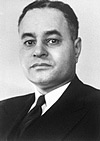 Bunche, Ralph Johnson (1904-1971), African American diplomat and political scientist, whose role as the architect of United Nations (UN) peacekeeping operations led to his being the first black American to receive the Nobel Peace Prize.
Born in Detroit, Michigan, Bunche spent his early years with his parents in Detroit and in Albuquerque, New Mexico. He attributed his achievements to the influence of his maternal grandmother, Lucy Johnson, with whom he lived in Los Angeles, California, after he was orphaned at age 13. Johnson not only insisted that her grandson be self-reliant and proud of his race, but also that he, a high school valedictorian, go to college.
Bunche, Ralph Johnson (1904-1971), African American diplomat and political scientist, whose role as the architect of United Nations (UN) peacekeeping operations led to his being the first black American to receive the Nobel Peace Prize.
Born in Detroit, Michigan, Bunche spent his early years with his parents in Detroit and in Albuquerque, New Mexico. He attributed his achievements to the influence of his maternal grandmother, Lucy Johnson, with whom he lived in Los Angeles, California, after he was orphaned at age 13. Johnson not only insisted that her grandson be self-reliant and proud of his race, but also that he, a high school valedictorian, go to college.
Bunche enrolled at the University of California at Los Angeles, and after graduating summa cum laude in 1927, he entered graduate school at Harvard University in Massachusetts. He was the first black American to earn a Ph.D. degree in political science from an American university. Bunche won the prize for the outstanding doctoral thesis in the social sciences in 1934. He conducted his postdoctoral research on African colonialism (see Colonial Rule). He did his research at Northwestern University in Illinois, the London School of Economics in England, and the University of Cape Town, South Africa, where he defied the South African government's objections to hosting a black scholar.
While still a graduate student, Bunche established himself as a professor and as an activist for civil rights. In 1928 he joined the faculty of Howard University, in Washington, D.C., where he founded and chaired the Political Science Department. Bunche expressed his commitment to racial integration and to economic improvement for workers during his years at Howard by participating in civil rights protests and in the establishment of the National Negro Congress in 1936. From 1938 to 1940 Bunche collaborated with Swedish sociologist Gunnar Myrdal on the research for Myrdal's massive study of American race relations, An American Dilemma: The Negro Problem and Modern Democracy (1944).
After years as a scholar of international politics, Bunche became active in World War II (1939-1945). In 1941 he left Howard University and joined the Office of Strategic Services (OSS)-the predecessor of the Central Intelligence Agency (CIA)-where he specialized in African affairs. Bunche moved to the State Department in 1944, and as the first African American to run a departmental division of the federal government, he continued to work on Africa and on colonial issues.
Bunche's association with the UN began in 1944. That year he participated in the Dumbarton Oaks Conference, which laid the groundwork for the UN Charter that was signed in San Francisco, California, a year later. In 1946 Bunche went to work full-time for the UN at the request of the organization's first secretary general, Trygve Lie. From 1947 to 1954 he served as the Principal Director of the Department of Trusteeship and Information from Non-Self-Governing Territories, a post that enabled him to assist with the process of decolonization (see Decolonization in Africa: An Interpretation).
Bunche first made his name as a peacemaker in 1949, when he defied all expectations and negotiated the truce that ended the first Arab-Israeli War. Originally sent to Jerusalem in 1948 as the assistant to UN mediator Count Folke Bernadotte, Bunche stepped in when Bernadotte was assassinated that same year. Bunche worked almost single-handedly to bring Israel and the Arab states to an agreement. For his efforts, Bunche was awarded the Nobel Prize for Peace in 1950.
In 1955 Bunche was appointed Undersecretary for Special Political Affairs. In that capacity he oversaw UN peacekeeping operations in some of the most heated conflicts around the world. As director of UN activities in the Middle East during and after the Suez Crisis of 1956 (see Suez Canal), Bunche broadened the organization's peacekeeping role with the creation of the United Nations Emergency Force. Additionally, Bunche represented the UN during crises in the Republic of the Congo, Cyprus, India, Pakistan, and Yemen. His successor, Sir Brian Urquhart, described Bunche as "the original principal architect" of the concept of international peacekeeping.
Despite the demands of an international career that lasted until just before his death, Bunche fulfilled extensive academic and civil rights commitments at home. His contributions as a scholar were recognized in 1953, when he was elected the first black president of the American Political Science Association. A longtime member of the National Association for the Advancement of Colored People (NAACP) board, Bunche won its Spingarn Medal in 1949. He acted as an unofficial adviser to several civil rights organizations and joined Martin Luther King Jr. in the 1965 Selma-to-Montgomery Voting Rights March. In 1963 U.S. president John F. Kennedy awarded Bunche the nation's highest civilian honor, the Medal of Freedom. A year after his 1970 retirement from the UN, Bunche died in New York.
Contributed By: Lawrie Balfour